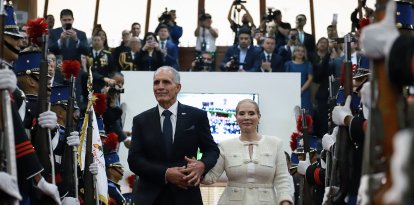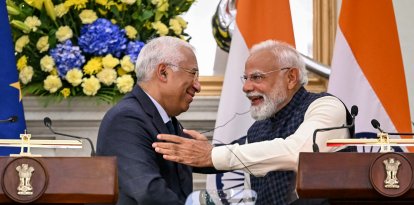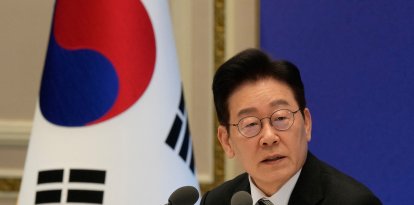Sudan, the ignored war causing the world's worst humanitarian crisis
Famine, forced displacement, human trafficking and extreme poverty. The civil strife is on its way to becoming one of the worst tragedies of the century.

(Cordon Press)
Tens of thousands have died, almost nine million are displaced, 20 million are starving and several million more need humanitarian aid. The most bloody and inhumane civil war in the world is taking place right now and yet it is hardly ever in the news. It is the most recent of the clashes suffered by Sudan, a country that has been ravaged by violence since it was founded. The war broke out in early 2023 when the National Army and the paramilitary forces Rapid Support Forces (RSF) finally clashed. This war has unleashed what, according to the United Nations, is a "humanitarian crisis of epic proportions." The consequences are spreading horror throughout the region as neighboring countries are unable to cope with the millions of people fleeing the war.
Nearly half of Sudan's 48 million inhabitants have some level of food deprivation, with high percentages reaching the most severe stages of the Integrated Phase Classification, the tool that measures food insecurity worldwide, placing them at the level of famine. According to the World Food Program (WFP), the situation is going to trigger "the biggest hunger crisis in the world." There are four million malnourished children plus another 19 million who are out of school, according to UNICEF calculations, which warns that malnutrition in children under five years of age is severe. If children that age do not receive an adequate level of nutrition, the risk of developiong physical and intellectual developmental problems is very high. A study published by the Clingendael Institute claims that Sudan is facing the worst level of hunger and predicts that "the severity and magnitude of hunger in the next lean season (mid-2024) will be catastrophic."
Regarding displacement, the situation is just as serious. Of the millions of people who have been forced to leave their homes, six million have moved within the country. Another three million have been internally displaced. These are often victims of previous conflicts who have been unable to return to their homes: "One in eight internally displaced persons in the world is Sudanese," says the UN, which makes the country the "largest IDP crisis in the world." All these movements of people are accompanied by violations, trafficking and reduction to servitude. This is typical of the mafias that are trying to manage the chaos of displacement. This, plus the added drama of those who have sought refuge in neighboring countries such as Chad, South Sudan or Egypt, makes it a regional crisis.
There are no banks, no money, no health, no education, no food, no security, no nothing.
Just as education has been interrupted, health services have suffered. Most hospitals are no longer operational, leading to an outbreak of diseases such as cholera, measles, malaria and dengue fever. There have been cases of two or three patients sharing a bed and a notable increase in infections and amputations. Doctors and assistants are also overwhelmed and exhausted. They lack the basic resources to be able to care for patients.
The proposed UN 2024 Plan for Humanitarian Affairs (OCHA) covers a much smaller percentage of the aid needed but even the little collected is very difficult to get into the country. Fighting has made the country unstable. There are constant attacks on health services and humanitarian aid. Routes are being cut off and supplies are being looted, which drastically reduces WFP aid. What little food and medicine is left to sell cannot be purchased by the Sudanese because the almost permanent power cuts affect the internet connection needed to make cash transfers. There are no banks, no money, no health, no education, no food, no security, no nothing.
A turbulent history
Sudan, since its origins and including its subsequent division between Sudan and South Sudan, has been invaded and colonized several times. The country has faced internal struggles leading to a convulsive, heterogeneous and unstable social and institutional structure. The North had a greater Islamic influence while the South had a strong Christian ancestry. Since its independence in 1956, the country has experienced constant ethnic and religious conflicts and a chain of coups d'état. It was also affected by the Cold War, as were many third-world countries. The country has been marked by the decolonization process for the last century. It is important to clarify that this conflict should not be confused with that of South Sudan, which after its independence fought its own internal war, leaving devastating and persistent consequences. South Sudan still has close economic and social ties with Sudan and is therefore permanently affected by its war.
The main geopolitical dimensions at stake include the interests of Russia, the United States, Saudi Arabia, the United Arab Emirates and Iran, in addition to the involvement of regional countries, all of which are fighting for influence in Sudan.
Internal tensions gave birth to the recognition of full autonomy for South Sudan in 2011, but this division, like the civil wars before it, did not bring peace to the poor Sudanese people. The situation worsened over the next decade as the deterioration and violence of the dictatorship of Omar al Bashir, who was deposed following the 2019 coup, deepened. Once again the hope of a lasting peace sustained in a democratic process was a short-lived mirage. After tense negotiations, the opposition and the army reached an agreement to share power until free elections were called. The civilian government was to be overseen by General Abdel al-Burhan, head of the Sudanese armed forces but immediately a new institutional coup took place and al-Burhan dissolved the Sovereign Council of Sudan appointing himself head of state indefinitely.
Tensions finally boiled over in April 2023, when the head of state al-Burhan and his ally General Mohamed Hamdan Daglo Hemedti, who leads an uprising military faction known as the Rapid Support Forces, clashed in the ongoing war that is now a year old. Since then, the Sudanese Armed Forces (SAF), which includes the Army, Navy and Air Force, have been fighting the Rapid Support Forces (RSF), a militia created at the time by the government to suppress an uprising in Darfur. In addition to the main warring sides, armed groups have multiplied. These are the same groups that had some residual structure or organization from previous wars.
Various efforts to reach a truce followed and by the end of 2023 peace talks in Saudi Arabia were established to protect civilians and ensure humanitarian aid for millions of Sudanese trapped for decades in the spiral of hunger and death. But all agreements were blatantly breached and the humanitarian crisis grew exponentially. The civil war in Sudan has devastated Khartoum, its capital, and several other cities. Although the vast majority of the contenders are Muslims, internal divisions still arise where identity and nationalist components have pitted ethnic groups against each other since the beginning of the war. This has added to the chaos. There have been numerous massacres, arrests and extrajudicial killings. While the situation is fluid and unstable, the RSF controls much of Khartoum and western Sudan, while the SAF controls the North and East.
It is mainly a civil war. However, foreign interference is permanent both in terms of mining, logistical importance and arms trafficking. The main geopolitical dimensions at stake include the interests of Russia, the United States, Saudi Arabia, the United Arab Emirates and Iran, in addition to the involvement of regional countries, all of which are fighting for influence in Sudan. The installation of a Russian base in the Red Sea, which was already agreed upon with the Sudanese military government, and Iran's intention to build a permanent naval base on its coast have also alerted Western powers.
Sexual violence, food shortages and famine are also weapons of this civil war.
Are there solutions in sight?
Cross-accusations between sides are ongoing and are also intertwined with the support of the warring national factions in the European Ukraine-Russia war. According to the various allegations, the United Arab Emirates (UAE) allegedly sent arms to the RSF and has provided political support. Similarly, Chad allegedly facilitated arms transfers from the UAE through its territory. The RSF is also allegedly linked commercially and logistically to the Wagner mercenary group, among other Russian entities. On the other hand, the Sudanese Armed Forces are accused of receiving assistance from Egypt and of having established relations with China and Iran. Diplomatically both parties are isolated. The United States and the European Union have imposed financial sanctions on the leaders of both sides and consider that they fuel the conflict. The government of Sudan has claimed to have evidence of foreign fighters operating in the paramilitary ranks.
The East African bloc IGAD and the African Union have tried to mediate in the talks. They tried to pressure the two parties to accept a ceasefire in light of the escalating conflict that is destabilizing the region. Likewise, humanitarian assistance groups are trying, so far unsuccessfully, to generate campaigns to mitigate the crisis. Sexual violence, food shortages and famine are also weapons of this civil war. Last December, the Rapid Support Forces invaded the Al Jazira region, the most developed agricultural area of the country, and forced citizens to enlist. The armed group has used food shortages as a weapon, withholding supplies in an attempt to coerce men and boys to join its ranks, witnesses told CNN. The war has left the country with limited internet access and the RSF is reportedly taking advantage of the communications blackout to extort money from the civilian population by charging residents to use the internet for bank transfers, taking a percentage of the amount sent from abroad.
Finally, refugee camps have been harassed by the contending sides and mafias have formed during this time. More than a quarter of the 108 settlements have been attacked more than once since April 2023. According to a Sky News investigation, more than 180 fires occurred in the settlements, affecting 108 villages, towns and cities since the start of the war. The fires are another element of a war that has led to the forced displacement of millions of people. A former British official in Sudan told Sky News that the repeated fires constitute a deliberate attempt to instill a high level of fear and extreme violence to subdue and expel the population.
There is no end in sight. The horrors of this crisis will continue to spread. Because of its humanitarian consequences, and because of its geopolitical ties, the war that is currently unfolding in Sudan is expected to become one of the greatest tragedies of the century.

























